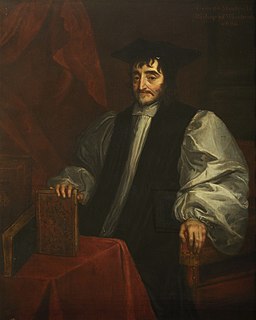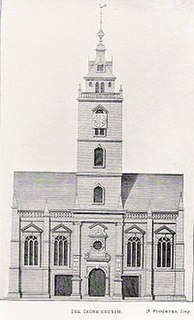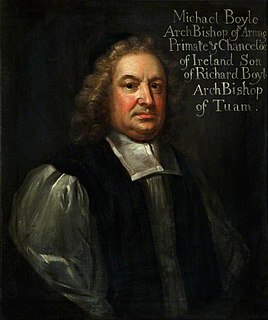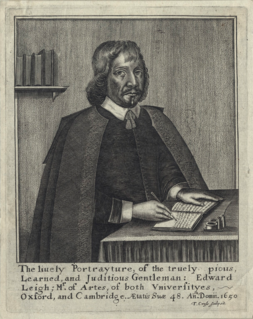Related Research Articles

Ralph Cudworth was an English Anglican clergyman, Christian Hebraist, classicist, theologian and philosopher, and a leading figure among the Cambridge Platonists who became 11th Regius Professor of Hebrew (1645–88), 26th Master of Clare Hall (1645–54), and 14th Master of Christ's College (1654–88). A leading opponent of Hobbes's political and philosophical views, his magnum opus was his The True Intellectual System of the Universe (1678).

John Campbell, 1st Earl of Loudoun was a Scottish politician and Covenanter.

George Morley was an English Anglican bishop, Bishop of Worcester and then of Winchester.

Heraldic visitations were tours of inspection undertaken by Kings of Arms throughout England, Wales and Ireland. Their purpose was to register and regulate the coats of arms of nobility, gentry and boroughs, and to record pedigrees. They took place from 1530 to 1688, and their records provide important source material for historians and genealogists.
Sir Steven Jenins was a wool merchant from Wolverhampton, Merchant of the Staple and Master Merchant Taylor who became Lord Mayor of London for the year of the coronation of King Henry VIII. An artistic, architectural and educational patron, he founded Wolverhampton Grammar School, and took a leading part in the rebuilding of the church of St. Andrew Undershaft in the City of London.
Sir Peter Wyche was an English diplomat and translator.

William Annand was a Scottish minister of the Church of Scotland who was the Dean of St Giles Cathedral in Edinburgh, Scotland.
Lazarus Seaman, was an English clergyman, supporter in the Westminster Assembly of the Presbyterian party, intruded Master of Peterhouse, Cambridge, and nonconformist minister.
Thomas Horton D.D. was an English clergyman, Professor of Divinity at Gresham College in London, and President of Queens' College, Cambridge.

Michael Boyle, the younger was a Church of Ireland bishop who served as Archbishop of Dublin from 1663 to 1679 and Archbishop of Armagh from 1679 to his death. He also served as Lord Chancellor of Ireland, the last time a bishop was appointed to that office.

Sir Edward Leigh was an English lay writer, known particularly for his works on religious topics, and a politician who sat in the House of Commons from 1645 to 1648.
Thomas Barnard was an Anglican clergyman who served in the Church of Ireland as Bishop of Killaloe and Kilfenora (1780–1794) and Bishop of Limerick, Ardfert and Aghadoe (1794–1806).
John Aucher D.D., (1619–1700) was an English clergyman and royalist supporter during the Commonwealth of Britain.
Lieutenant Colonel Sir William Morton KS was an English judge and politician who sat in the House of Commons in 1640 and from 1663 to 1665. He fought on the Royalist side in the English Civil War.

Samuel Fuller or Fulwar (1635–1700), was Dean of Lincoln.
William Leveson was a member of the Worshipful Company of Mercers and of the Company of Merchant Adventurers. Together with Thomas Savage, he was one of the trustees used by the original shareholders of the Globe Theatre in the allocation of their shares in 1599. Later, Leveson was involved in the suppression of the Essex rebellion on 8 February 1601. In 1613 he was sued by the Virginia Company.
Robert Pory or Porey (c.1608?–1669) was an English churchman, archdeacon of Middlesex from 1660.
Edward Hyde (1607–1659) was an English royalist cleric, nominally Dean of Windsor at the end of his life.

John Balderston was an academic at the University of Cambridge, master of Emmanuel College and twice vice-chancellor of the university.
John Creighton, was a 17th-century Anglican Dean in Ireland.
References
- 1 2 3 4 5 Cooper 1886, p. 394.
- ↑ Cooper 1886 , p. 394 cites Kennett, Register and Chron. 226.
- ↑ Cooper 1886 , p. 394 cites Kennett, Register and Chron. 281.
- ↑ Cooper 1886 , p. 394 cites Kennett, Register and Chron. Wood, Fasti Oxon. ii. 55 n.
- ↑ Cooper 1886 , p. 394 cites Autokatakritos: or Hypocrisie unvail'd, 15.
- ↑ N H Keeble and G F Nuttall (eds) Calendar of the Correspondence of Richard Baxter (Oxford 1991) letter 693 and R Thomas The Baxter Treatises, a catalogue of the Richard Baxter papers (other than the letters) in Dr Williams's Library: Dr Williams's Library Occasional Paper no 8 (1959) p.11
- Attribution
 This article incorporates text from a publication now in the public domain : Cooper, Thompson (1886). "Boreman, Robert". In Stephen, Leslie (ed.). Dictionary of National Biography . 5. London: Smith, Elder & Co. p. 394. Sources:
This article incorporates text from a publication now in the public domain : Cooper, Thompson (1886). "Boreman, Robert". In Stephen, Leslie (ed.). Dictionary of National Biography . 5. London: Smith, Elder & Co. p. 394. Sources: - Addit. MS. 5846 f. 121b, 133, 231b, 5863 f. 19;
- Kennett's Register and Chron. 226, 251, 281, 611, 724, 734;
- Lysons's Environs, iv. 477;
- Newcourt's Repertorium Ecclesiasticum, i. 613, 922;
- Wood's Fasti Oxon. ed. Bliss, ii. 55;
- Wood's Hist. and Antiq. of the Univ. of Oxford, ed. Gutch, ii. pt. ii. 659;
- Sylvester's Life of Baxter, 79, 377, 378, 380, pt. iii. 172, 179, Append. No. 7, p. 117;
- Lloyd's Memoirs of Excellent Personages (1677), 450;
- Calamy's Ejected Ministers (1727), ii. 908;
- Phillimore's Alumni Westmon. 20, 98, 99;
- Le Neve's Fasti Eccl. Anglic. ed. Hardy, iii. 361;
- Gough's British Topography, i. 483;
- Widmore's Hist. of Westm. Abbey, 224;
- Hasted's Kent, ii. 783.